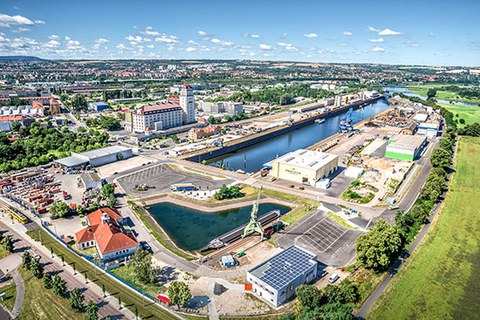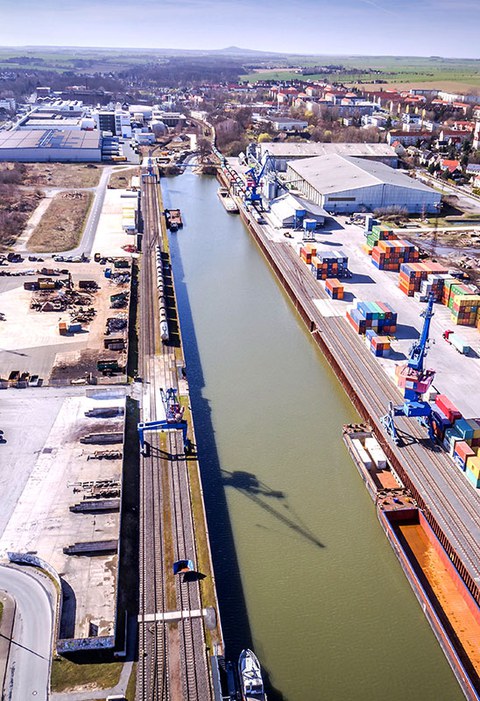A logistics expert on binational inland ports
(Interview from 2019)
Dagmar Möbius
Had the Berlin Wall not come down, Heiko Loroff might have been building machinery for the jewelry industry today. But it did, and in that period of upheaval, he had to abandon his first degree and change his subject. Today, the urban logistics engineer is very happy with how things turned out. He has been managing a transnational group of companies for seven years, and is responsible for several inland ports in Saxony and the Czech Republic.

Heiko Loroff is an urban logistics engineer. He heads the Saxon and Czech inland ports group.
Heiko Loroff was sent by his employer VEB Ostseeschmuck in 1990 to study mechanical engineering at TU Dresden, bringing him south from the Baltic coast. VEB Ostseeschmuck was a major jewelry producer and exporter in the GDR, but in the wake of German reunification, the company underwent huge changes and has been privatized since 1992. For Heiko Loroff, this meant the end of his studies after just one year. "Yet at the same time, it was a new beginning," says the 50-year-old. "As I had always been interested in transportation, I transferred to the Hochschule für Verkehrswesen (University of Transportation) in 1991 and enrolled in the new logistics program." After two years of fundamental studies, Heiko Loroff transferred to the Faculty of Transport and Traffic Sciences at TU Dresden.
"It was a good decision," he says, and praises the hands-on, innovative program with few students in a then largely unknown field. The curriculum included railroad engineering, factory planning and mass transit, transportation and land use planning, warehouse logistics, and much more. Heiko Loroff has fond memories of Professor Siegfried Rüger († 2007), who taught him all the essentials of urban and regional transport. He also remembers the huge model railroad (now the Railway Operation Laboratory) with its five stations, and explains that "it wasn't a gimmick; it taught us how a railroad business operates." The logistics specialist conducted his final-year project in a Dresden freight forwarding company. He set up a quality management system, revised all the necessary documents, and ensured that the company could achieve ISO 9001 certification. "So my degree also trained me to become a quality manager," he jokes. No wonder the company hired him as branch manager as soon as he graduated.
After a year, however, Heiko Loroff was tempted by a bigger challenge: In 1998, he became logistics manager at Kronospan GmbH Lampertswalde, which was looking to break new ground in supply and disposal. "I needed everything I learned at university, really everything," he says. "From air and maritime law and warehouse logistics to transport and customs law to English." Heiko Loroff worked up to 16 hours a day and traveled all over the world. In the US, for example, he set up two warehouses for the specialist in work surfaces. The warehouses were then operated online from Germany. "I'm proud of that as an East German," he says, adding, "those ten years would open a lot of doors for me." Looking to grow further in his career, the engineering graduate became branch manager at Kühne & Nagel GmbH & Co.KG in 2009. There, he was responsible for worldwide heavy cargo logistics and oversaw three to four branches. Factory relocations and the construction and dismantling of solar energy facilities were part of his job.

Aerial view of the Alberthafen Dresden port. From here, Heiko Loroff controls the fortunes of six ports in two different countries.
After three years in the role, Heiko Loroff happened upon a job ad. Sächsische Binnenhäfen Oberelbe GmbH, a subsidiary of the Free State of Saxony, was looking for a new director. He already knew the company from his student days when he had worked as a driver at the port. "They're looking for me," he told his wife, and he was proved right. He was invited for an interview the very next day, and ultimately won out over 60 applicants in a comprehensive assessment process. Since 2012, Heiko Loroff has managed four German ports in Dresden, Riesa, Torgau, and Roßlau, and since 2013, he has also managed the Czech inland ports of Děčín and Lovosice. He also serves on the supervisory board of the port of Dessau.
As director, he is responsible for all business processes and for 150 employees – including graduates of TU Dresden – in 30 different fields and two different countries. This is challenging, and not only because of the language barriers. Heiko Loroff speaks the language, but says that "leading in the Czech Republic requires a different style than in Germany. People have a different mentality and different priorities in life. They set objectives differently than Germans do." Heiko Loroff enjoys being able to work on both sides of the border. "All employees can work in all the ports; they are familiar with the same technology and the same software." He puts staff turnover at almost zero. The company has no shortage of skilled workers. In fact, there is a waiting list for any posts that become vacant. And this despite the fact that salaries are not high above the industry norm. "A good working environment and being able to balance work and family are important to me," says the father of two. His secret? "Being there for people." That approach should become even wider knowledge amongst potential trainees, as Sächsische Binnenhäfen also hires apprentices. "Trainee port logistics specialists spend three years learning about everything from driving diggers and cranes, storage, and cargo inspection to processing shipping documents and accounting."

The inland port of Riesa. All employees of the group can work in any of the six ports.
For Heiko Loroff, there is no such thing as a typical workday. New challenges await him every morning. His schedule is already full until the end of 2020. "There's no such thing as absence," says the urban logistics specialist, who describes himself as a hardy soul. "But that's not a problem in the digital age; I don't want to be out of the loop. There are certain jobs we just can't miss out on." That's why he has a strong network and works on numerous bodies, for example the board of the ShortSeaShipping Inland Waterway Promotion Center based at the German Federal Ministry of Transport and Digital Infrastructure (since 2013) and the rail freight transport board at the Verband Deutscher Verkehrsunternehmen (Association of German Transport Companies).
Research and academia never appealed to Loroff, who is one of few specialists in the country in his field. There is, however, still the odd project that connects him to TU Dresden. Sächsische Binnenhäfen Oberelbe GmbH (SBO) is also involved in many regional and international transport projects funded by the state, the federal government, and the EU. The company was involved in a major study on logistics in Saxony, and is currently working on the EU CorCap project, which aims to improve transport links in the Orient/East-Med corridor.
Famous visitors to SBO: Prince Albert II of Monaco was awarded the 2018 Taurus European culture award in Dresden in June 2018 for his commitment to nature and marine conservation. Regional media outlets (DNN) reported on the visit.
Does the native of Mecklenburg miss the water in Saxony? "There's a bit of water here, too, but home is home," laughs Heiko Loroff. As often as he can, he visits his family at the Baltic Sea, and goes motor boating or fishing. And vacations have to be close to the water. Southern France or the Baltic Sea, "but not in the middle of summer."
Contact:
Sächsische Binnenhäfen Oberelbe GmbH
Geschäftsführer Dipl.-Ing. Heiko Loroff
Magdeburger Straße 58
01067 Dresden
Tel.: +49 351/ 4982-200
Email
Website
Related links:
Faculty of Transport and Traffic Sciences
Interreg Central Europe
